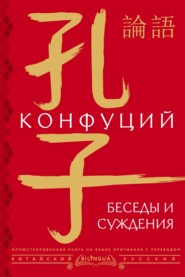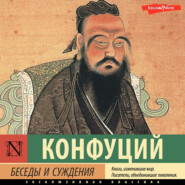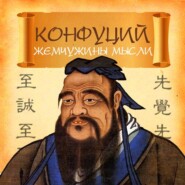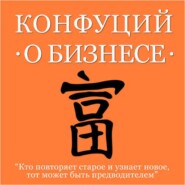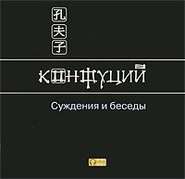По всем вопросам обращайтесь на: info@litportal.ru
(©) 2003-2024.
✖
Chinese Literature
Автор
Год написания книги
2018
Настройки чтения
Размер шрифта
Высота строк
Поля
When he entered the palace gate, it was with the body somewhat bent forward, almost as though he could not be admitted. When he stood still, this would never happen in the middle of the gateway; nor when moving about would he ever tread on the threshold. When passing the throne, his look would change somewhat, he would turn aside and make a sort of obeisance, and the words he spoke seemed as though he were deficient in utterance.
On going up the steps to the audience chamber, he would gather up with both hands the ends of his robe, and walk with his body bent somewhat forward, holding back his breath like one in whom respiration has ceased. On coming out, after descending one step his countenance would relax and assume an appearance of satisfaction. Arrived at the bottom, he would go forward with quick step, his elbows evenly bent outwards, back to his position, constrainedly reverent in every movement.
When holding the sceptre in his hand, his body would be somewhat bent forward, as if he were not equal to carrying it; wielding it now higher, as in a salutation, now lower, as in the presentation of a gift; his look would also be changed and appear awestruck; and his gait would seem retarded, as if he were obeying some restraining hand behind.
When he presented the gifts of ceremony, he would assume a placid expression of countenance. At the private interview he would be cordial and affable.
The good man would use no purple or violet colors for the facings of his dress.[22 - Because, it is said, such colors were adopted in fasting and mourning.] Nor would he have red or orange color for his undress.[23 - Because they did not belong to the five correct colors (viz. green, yellow, carnation, white, and black), and were affected more by females.] For the hot season he wore a singlet, of either coarse or fine texture, but would also feel bound to have an outer garment covering it. For his black robe he had lamb's wool; for his white one, fawn's fur; and for his yellow one, fox fur. His furred undress robe was longer, but the right sleeve was shortened. He would needs have his sleeping-dress one and a half times his own length. For ordinary home wear he used thick substantial fox or badger furs. When he left off mourning, he would wear all his girdle trinkets. His kirtle in front, when it was not needed for full cover, he must needs have cut down. He would never wear his (black) lamb's-wool, or a dark-colored cap, when he went on visits of condolence to mourners.[24 - Since white was, as it is still, the mourning color.] On the first day of the new moon, he must have on his Court dress and to Court. When observing his fasts, he made a point of having bright, shiny garments, made of linen. He must also at such times vary his food, and move his seat to another part of his dwelling-room.
As to his food, he never tired of rice so long as it was clean and pure, nor of hashed meats when finely minced. Rice spoiled by damp, and sour, he would not touch, nor tainted fish, nor bad meat, nor aught of a bad color or smell, nor aught overdone in cooking, nor aught out of season. Neither would he eat anything that was not properly cut, or that lacked its proper seasonings. Although there might be an abundance of meat before him, he would not allow a preponderance of it to rob the rice of its beneficial effect in nutrition. Only in the matter of wine did he set himself no limit, yet he never drank so much as to confuse himself. Tradesmen's wines, and dried meats from the market, he would not touch. Ginger he would never have removed from the table during a meal. He was not a great eater. Meat from the sacrifices at the prince's temple he would never put aside till the following day. The meat of his own offerings he would never give out after three days' keeping, for after that time none were to eat it.
At his meals he would not enter into discussions; and when reposing (afterwards) he would not utter a word.
Even should his meal consist only of coarse rice and vegetable broth or melons, he would make an offering, and never fail to do so religiously.
He would never sit on a mat that was not straight.
After a feast among his villagers, he would wait before going away until the old men had left.
When the village people were exorcising the pests, he would put on his Court robes and stand on the steps of his hall to receive them.
When he was sending a message of inquiry to a person in another State, he would bow twice on seeing the messenger off.
Ki K'ang once sent him a present of some medicine. He bowed, and received it; but remarked, "Until I am quite sure of its properties I must not venture to taste it."
Once when the stabling was destroyed by fire, he withdrew from the Court, and asked, "Is any person injured? "—without inquiring as to the horses.
Whenever the prince sent him a present of food, he was particular to set his mat in proper order, and would be the first one to taste it. If the prince's present was one of raw meat, he must needs have it cooked, and make an oblation of it. If the gift were a live animal, he would be sure to keep it and care for it.
When he was in waiting, and at a meal with the prince, the prince would make the offering,[25 - The act of "grace," before eating.] and he (the Master) was the pregustator.
When unwell, and the prince came to see him, he would arrange his position so that his head inclined towards the east, would put over him his Court robes, and draw his girdle across them.
When summoned by order of the prince, he would start off without waiting for his horses to be put to.
On his entry into the Grand Temple, he inquired about everything connected with its usages.
If a friend died, and there were no near relatives to take him to, he would say, "Let him be buried from my house."
For a friend's gift—unless it consisted of meat that had been offered in sacrifice—he would not bow, even if it were a carriage and horses.
In repose he did not lie like one dead. In his home life he was not formal in his manner.
Whenever he met with a person in mourning, even though it were a familiar acquaintance, he would be certain to change his manner; and when he met with any one in full-dress cap, or with any blind person, he would also unfailingly put on a different look, even though he were himself in undress at the time.
In saluting any person wearing mourning he would bow forwards towards the front bar of his carriage; in the same manner he would also salute the bearer of a census-register.
When a sumptuous banquet was spread before him, a different expression would be sure to appear in his features, and he would rise up from his seat.
At a sudden thunder-clap, or when the wind grew furious, his look would also invariably be changed.
On getting into his car, he would never fail (first) to stand up erect, holding on by the strap. When in the car, he would never look about, nor speak hastily, nor bring one hand to the other.
"Let one but make a movement in his face,
And the bird will rise and seek some safer place."
Apropos of this, he said, "Here is a hen-pheasant from Shan Liang—and in season! and in season!" After Tsz-lu had got it prepared, he smelt it thrice, and then rose up from his seat.
BOOK XI
Comparative Worth of His Disciples
"The first to make progress in the Proprieties and in Music," said the Master, "are plain countrymen; after them, the men of higher standing.
If I had to employ any of them, I should stand by the former."
"Of those," said he, "who were about me when I was in the Ch'in and Ts'ai States, not one now is left to approach my door."
"As for Hwui,"[26 - The men of virtuous life were Yen Yuen (Hwúi), Min Tsz-k'ien, Yen Pihniu, and Chung-kung (Yen Yung); the speakers and debaters were Tsai Wo and Tsz-kung; the (capable) government servants were Yen Yu and Tsz-lu; the literary students, Tsz-yu and Tsz-hiá.] said the Master, "he is not one to help me onthere is nothing I say but he is not well satisfied with."
"What a dutiful son was Min Tsz-k'ien!" he exclaimed. "No one finds occasion to differ from what his parents and brothers have said of him."
Nan Yung used to repeat three times over the lines in the Odes about the white sceptre. Confucius caused his own elder brother's daughter to be given in marriage to him.
When Ki K'ang inquired which of the disciples were fond of learning, Confucius answered him, "There was one Yen Hwúi who was fond of it; but unfortunately his allotted time was short, and he died; and now his like is not to be found."
When Yen Yuen died, his father, Yen Lu, begged for the Master's carriage in order to get a shell for his coffin. "Ability or no ability," said the Master, "every father still speaks of 'my son.' When my own son Li died, and the coffin for him had no shell to it, I know I did not go on foot to get him one; but that was because I was, though retired, in the wake of the ministers, and could not therefore well do so."
On the death of Yen Yuen the Master exclaimed, "Ah me! Heaven is ruining me, Heaven is ruining me!"
On the same occasion, his wailing for that disciple becoming excessive, those who were about him said, "Sir, this is too much!"—"Too much?" said he; "if I am not to do so for him, then—for whom else?"
The disciples then wished for the deceased a grand funeral. The Master could not on his part consent to this. They nevertheless gave him one. Upon this he remarked, "He used to look upon me as if I were his father. I could never, however, look on him as a son. Twas not my mistake, but yours, my children."
Tsz-lu propounded a question about ministering to the spirits of the departed. The Master replied, "Where there is scarcely the ability to minister to living men, how shall there be ability to minister to the spirits?" On his venturing to put a question concerning death, he answered, "Where there is scarcely any knowledge about life, how shall there be any about death?"
The disciple Min was by his side, looking affable and bland; Tsz-lu also, looking careless and intrepid; and Yen Yu and Tsz-kung, firm and precise. The Master was cheery. "One like Tsz-lu there," said he, "does not come to a natural end."
Some persons in Lu were taking measures in regard to the Long Treasury House. Min Tsz-k'ien observed, "How if it were repaired on the old lines?" The Master upon this remarked, "This fellow is not a talker, but when he does speak he is bound to hit the mark!"
"There is Yu's harpsichord," exclaimed the Master—"what is it doing at my door?" On seeing, however, some disrespect shown to him by the other disciples, he added, "Yu has got as far as the top of the hall; only he has not yet entered the house."
Tsz-kung asked which was the worthier of the two—Tsz-chang or Tsz-hiá. "The former," answered the Master, "goes beyond the mark; the latter falls short of it."
"So then Tsz-chang is the better of the two, is he?" said he.
"To go too far," he replied, "is about the same as to fall short."







